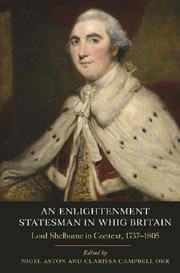Introduction
Published online by Cambridge University Press: 05 September 2013
Summary
William Petty, 2nd Earl of Shelburne, created 1st Marquess of Lansdowne in 1784, is the least studied statesman of the reign of George III. The only modern monograph on him was written in 1963 by John Norris, and concentrated on Economical (i.e. administrative) Reform. This dearth is in part a tribute to the longevity of the three-volume biography written by Shelburne's descendant, the minor Liberal politician Lord Edmond Fitzmaurice (later created 1st Baron Fitzmaurice), based securely on the family archives. That there is such an abundance of archival sources makes the omission the more glaring. The William L. Clements Library at Ann Arbor bought a selection of papers when they were sold in the 1920s. Access to what remained at Bowood was, admittedly, for a while problematic despite the papers being xeroxed by the Bodleian Library. After the death of the 6th Marquess, there was a further sale to the British Library with a relatively small residue being left with the family at Bowood. The essays in this book are based squarely on these unpublished sources. They are a contribution toward his systematic reassessment, and reflect new perspectives on political life, gender, and the Enlightenment, that have developed since Norris's work was published. They are intended to provoke new debate and further research. Selected aspects of Shelburne's life and career receive fresh attention in this collection; other avenues for further exploration are also suggested in this introduction. There are several conceptual frames through which the life and career of Lord Shelburne can be examined. The most obvious is his role in high politics.
- Type
- Chapter
- Information
- An Enlightenment Statesman in Whig BritainLord Shelburne in Context, 1737–1805, pp. 1 - 26Publisher: Boydell & BrewerPrint publication year: 2011



